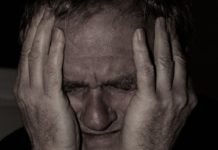There’s No Duct Tape for Benzo Withdrawal
It’s stunning what a quarter milligram of a benzodiazepine can do to the body. I’ve been detoxing off a high dose of benzodiazepines since September of 2011. The first few months were a failure. But this past May, I found my expert and thought I had the formula. Things were going well for detoxing off a substance many deem more addictive that heroin. That is, I realized, until they weren’t.
The Gauntlet of Protracted Benzodiazepine Withdrawal
My doctor insisted that my symptoms could not be associated with withdrawal – they had to be symptoms of an underlying condition. I have since learned from legitimate sources that protracted withdrawal syndrome from benzodiazepines can intensify long before it abates, with some symptoms lasting for years.
More on Benzos and Cognitive Damage
There is mounting evidence that benzodiazepines are causing Alzheimer's Disease. I cannot imagine any genuine medical specialty ignoring or downplaying information of this sort. But psychiatry, with the perennial defensiveness of those with something to hide, promotes the idea that they are safe when used for short periods, knowing full well that a huge percentage of users become "hooked" after a week or two, and stay on the drugs indefinitely.
Electroshocking Children: Why It Should Be Stopped
In a recent commentary, University of Toronto historian Edward Shorter laments the efforts of people like myself in states like Texas who have successfully put limits on shocking children in order to induce grand mal convulsions. His argument is that we who have fought against this are denying children a benevolent medical treatment. In order to understand why Shorter’s plea to use electroshock on children is so egregious, we need to know what it does to children’s brains, which means a look at the science.
How Reliable is the DSM-5?
More than a year on from the release of DSM-5, a Medscape survey found that just under half of clinicians had switched to using the new manual. Most non-users cited practical reasons, typically explaining that the health care system where they work has not yet changed over to the DSM-5. Many, however, said that they had concerns about the reliability of the DSM, which at least partially accounted for their non-use. Throughout the controversies that surrounded the development and launch of the DSM-5 reliability has been a contested issue: the APA has insisted that the DSM-5 is very reliable, others have expressed doubts. Here I reconsider the issues: What is reliability? Does it matter? What did the DSM-5 field trials show?
Stopping the Madness: Coming Off Psychiatric Medications
Millions of patients find themselves caught in the web of psychiatric sorcery - a spell cast, hexed, potentially for life. They are told that they have chemical imbalances. They are told that the most important thing they can do for themselves is to "take their medication," and that they will have to do so "for life." Most egregiously, patients are sold the belief that medication is treating their disease rather than inducing a drug effect no different than alcohol or cocaine. That antidepressants and antipsychotics, for example, have effects like sedation or blunting of affect, is not a question. That these effects are reversible after long-term exposure is.
Transcranial Magnetic Stimulation
TMS is a psychiatric treatment that uses a rapidly alternating magnetic field to induce electric currents in the brain. These currents stimulate neurons, causing them to "fire." When used repetitively, TMS is said to alter the excitability of the brain area that has been stimulated. In the psychiatric field, TMS is being used increasingly as a treatment for depression, particularly with so-called treatment-resistant clients. I Googled the string "TMS + depression" and got 1.35 million hits. So the idea is attracting attention.
The Case Against Antipsychotics
This review of the scientific literature, stretching across six decades, makes the case that antipsychotics, over the long-term, do more harm than good. The drugs lower recovery rates and worsen functional outcomes over longer periods of time.
My Diagnosis of ADHD and the Downfall That Followed
A simple, one-time visit to an unfamiliar counselor resulted in my diagnosis of ADHD. That same visit started my avalanche of drug abuse. I was 19 years old when I was falsely diagnosed with ADHD, and it forever changed my life.
Studies of Reared-Apart (Separated) Twins: Facts and Fallacies
Twin studies supply the most frequently cited evidence in favor of important genetic influences on human behavioral differences. In an extremely small yet influential handful of studies, twin pairs were said to have been reared apart in different families. Twin researchers and others view this occurrence as the ultimate test of the relative influences of nature (genes) and nurture (environment). According to this view all behavioral resemblance between reared-apart MZ twin pairs (known as “MZA” pairs) must be the result of their 100% genetic similarity, because such pairs share no environmental similarity. But, far from being separated at birth and reared apart in randomly selected homes representing the full range of potential behavior-influencing environments, and meeting each other for the first time when studied, most MZA pairs were only partially reared apart, and grew up in similar cultural and socioeconomic environments at the same time.
Societies With Little Coercion Have Little Mental Illness
Coercion — the use of physical, legal, chemical, psychological, financial, and other forces to gain compliance — is intrinsic to our society’s employment, schooling, and parenting, but it isn’t to less “civilized” societies. Coercion fuels miserable marriages, unhappy families, and what we today call mental illness. Psychiatrist E. Fuller Torrey, in Schizophrenia and Civilization, states “Schizophrenia appears to be a disease of civilization.” But Torrey is a strong advocate for coercive treatments, including forced medication — even though his own research shows a stronger relationship between severe mental illness and European-American civilization than with hypothesized biochemical agents that have never been found. Still, he has he not considered the toxic effects of coercion.
Stop The War On Chronic Pain Patients
Much has been written lately about an "epidemic" of opioid overdose deaths, in some cases advocating for a blanket reduction in the availability of prescription opioids. Regrettably, many readers will not penetrate beneath the sensational headlines to grapple with the complicated realities of this issue. Few who aren't themselves in pain may realize what harm such articles are doing to tens of millions of people.
Setbacks
Oddly enough, it had occurred to me over this past year as I’ve been writing these essays for Mad in America that maybe I was “too healthy” to speak to the withdrawal experience with authenticity, to have street cred. It’s now a moot point. I write this not to scare people, but to present a reality. This reality has been difficult to accept, but the fact remains that my nervous system is more sensitive than before and might always be so, at least to some degree.
Not So Rare But Rarely Diagnosed: From Demonic Possession to Anti-NMDA Receptor Encephalitis
Throughout the ages, convulsions, contortions of the body and face, including the tongue, super-human strength, catatonic periods, long periods of wakefulness or sleep, insensitivity to pain, speaking in tongues, and a predilection for self-injurious behaviours have all been offered as physical evidence of possession. The modern day interpretation, however, comes with a plot twist befitting a media spectacle. There is growing consensus in the medical community that many prior accounts of “demonic possession” may have represented original accounts of what is now broadly known as autoimmune encephalitis.
Why We Must Strike the Terms “High Functioning” and “Low Functioning” from Our Vocabulary
As I have various discussions about mental health and disability on the internet, I am disturbed at how many people continue to use the terms “high functioning” and “low functioning” when referring to people with psychiatric or other disabilities. I have heard people refer to their family members as “low functioning.” I have seen these terms used by advocates to bully and discredit other advocates who critique calls for increased levels of involuntary treatment as “high functioning” individuals who don’t know what they’re talking about.
No, There is no Such Thing as ADHD
Somewhere along the line we have lost the understanding that kids come in all shapes and sizes. Some kids are active, some are quiet; some kids are dreamers, others are daring; some kids are dramatic, others are observers; some impulsive, others reserved; some leaders, others followers; some athletic, others thinkers. Where did we ever get the notion that kids should all be one way?
Cognitive Behavioral Therapy: The Good, The Bad, The Limitations
Cognitive Behavioral Therapy (CBT) has been a hot topic of late. In the recent MIA blog posting, “Colonization or Post Psychiatry,” multiple references were made about “system therapists” promoting CBT coming into the Hearing Voices Movement to possibly dilute or co-opt the essential revolutionary character of the movement, thus turning it into something more mainstream and less threatening to the status quo of Biological Psychiatry’s oppressive medical model.
Reasons Not to Believe in Lithium
‘I Don’t Believe in God, But I Believe in Lithium’ is the title of Jamie Lowe’s moving account of her manic depression in the New York Times. The piece reminds us how devastating and frightening this condition can be, so it is understandable that the author put her faith in the miracle cure psychiatrists have been recommending since the 1950s: lithium. The main problem is that there is no study in which people who have been started on lithium have been compared with people who haven’t.
Benzos: A Dance With the Devil
Beginning with the glamorization of Miltown in the 1950’s, the “I don’t care” pill was a way to ease the growing awareness that the world is indeed unsafe, and that something is deeply bankrupt in the promises of burgeoning science, technology, and industrialization. Still, we sought to heal these wounds through application of more of the same mentality – one of dominance, management, and suppression of all obstacles into submission. As our bodies, minds, and spirits become more and more separated from nature, each other, and ourselves, the worry, discomfort, and unease mount. Now that the going has gotten very tough, we are reaching for medications more than ever. Surely, however, turning off the smoke alarm is not the best way to deal with a fire.
Cognitive Behavioural Therapy Does Not Exist
Since the 1980s, a type of psychotherapy called Cognitive Behavioural Therapy (CBT) has become dominant. Like it or loathe it, CBT is now so ubiquitous it is often the only talking therapy available in both public and voluntary health settings. It is increasingly spoken about in the media and in living rooms across the country. Yet when we speak about CBT, what are we talking of? For CBT only exists - as we will see - as a political convenience.
Reflections on a Beautiful Mind
In the past 50 years, the story of John Nash, as told first in the book A Beautiful Mind and then in the film that starred Russell Crowe as the great mathematician, is perhaps the best-known story of a person diagnosed with schizophrenia who “recovered.” Today, with obits appearing in the newspaper following his death on Saturday in a car crash in New Jersey, it is worth remembering how the true story of his recovery was hijacked in the movie and turned into an ad for a second generation of psychiatric medications.
Depression: It’s Not Your Serotonin
What if I told you that, in 6 decades of research, the serotonin (or norepinephrine, or dopamine) theory of depression and anxiety - the claim that “Depression is a serious medical condition that may be due to a chemical imbalance, and Zoloft works to correct this imbalance” - has not achieved scientific credibility? You’d want some supporting arguments for this shocking claim. So, here you go:
What is Critical Psychiatry?
Over the last twenty years there has emerged a body of work that questions the assumptions that lie beneath psychiatric knowledge and practice. This work, appearing as academic papers, magazine articles, books, and chapters in books, hasn’t been written by academics, sociologists or cultural theorists. It has emerged from the pens and practice of a group of British psychiatrists.
Lithium and Suicide: What Does the Evidence Show?
There appears to be increasing acceptance of the idea that lithium prevents suicide, and even that it can reduce mortality rates. For a toxic drug that makes most people feel rather depressed, this seems curious. I did wonder whether it might be having this effect on suicide by sapping people of the will to act, but the proposed effect on mortality seems completely inexplicable. A closer look at the evidence, however, suggests the idea is simply not justified.
Are Micronutrients a Waste of Time? – A Randomized Controlled Trial
Julia has received a lot of media attention in the last few days as a result of her blinded RCT published in a prominent journal, the British Journal of Psychiatry, showing that micronutrients were better than placebo at improving ADHD and mood symptoms in adults. But what interests us far more is the amount of public emails we get as a result of this work. And the theme running through almost every email is that the child/adult/husband/wife has tried all kinds of medications and the symptoms are still there and, often, getting worse. Could the micronutrients help?















